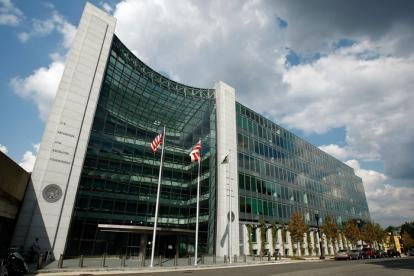Recent SEC staff no-action letter allows certain sub-advisers to avoid the burdensome surprise examination requirement under the Custody Rule.
On April 25, the US Securities and Exchange Commission (SEC) staff provided limited but important no-action relief from the requirement to obtain an annual surprise examination imposed by Rule 206(4)-2 (Custody Rule) under the Investment Advisers Act of 1940.[1]
Under this relief, a sub-adviser in an investment advisory program that does not have actual custody of assets, but that is deemed to have custody because the related person qualified custodian is either the primary adviser or an affiliate of the primary adviser, would not need to obtain an annual surprise examination if the primary adviser is responsible for complying with the Custody Rule. The SEC staff’s no-action letter came as a result of discussions we have had with the staff over the course of several months.
Background
The Custody Rule includes requirements that are designed to safeguard client assets “from being lost, misused, misappropriated or subject to advisers’ financial reverses.”[2] An investment adviser that has “custody” of its clients’ assets is required to:
-
maintain those assets with a “qualified custodian”;
-
notify clients about the qualified custodian;
-
have a reasonable basis, after due inquiry, for believing that the qualified custodian sends quarterly account statements to the adviser’s clients; and
-
obtain an annual surprise examination by an independent public accountant.
For purposes of the Custody Rule, an investment adviser has “custody” if it holds, directly or indirectly, client funds or securities, or has authority to obtain possession of them. An adviser is also deemed to have custody if a related person has custody in connection with advisory services that the adviser provides to clients.[3]
The Custody Rule imposes heightened requirements where an investment adviser or its related person serves as the qualified custodian. First, the independent public accountant performing the surprise examination must be registered with and subject to regular inspection by the Public Company Accounting Oversight Board (PCAOB). Second, the adviser must obtain, or receive from its related person, a written internal control report from an independent public accountant registered with the PCAOB that includes an opinion about whether the internal custodial controls are suitably designed and operating effectively. In addition, the independent public accountant must verify that the client assets are reconciled to an independent custodian.
The amendments to the Custody Rule have raised questions about its application to sub-advisers in investment advisory programs where (i) the primary adviser is a related person of the sub-adviser and (ii) the primary adviser or its affiliate serves as qualified custodian. In this type of sub-advisory arrangement, the Custody Rule might be interpreted broadly to require both the primary adviser and the sub-adviser to obtain an annual surprise examination by a PCAOB-registered independent public accountant.
The SEC Staff’s No-Action Letter
The staff’s letter clarifies that a sub-adviser in an investment advisory program for which the related person qualified custodian is either the primary adviser or an affiliate of the primary adviser may forego the annual surprise examination requirement if the primary adviser is responsible for complying with the Custody Rule, including the surprise examination requirement. The SEC staff’s no-action relief appears to recognize that requiring the sub-adviser to obtain an annual surprise examination would be duplicative and unnecessarily costly.
The relief, however, is limited to a sub-adviser whose sole basis for having custody is its affiliation with the qualified custodian and that, as a result, the sub-adviser does not (i) hold client assets, (ii) have the authority to obtain possession of client assets, or (iii) have the authority to deduct fees from client accounts.
A sub-adviser that is deemed to have custody would, however, remain subject to the Custody Rule’s requirement to obtain from the primary adviser or qualified custodian annually a written internal control report prepared by a PCAOB-registered independent public accountant. This is similar to the approach the SEC took in providing a limited exception from the surprise examination requirement for an investment adviser that is “operationally independent” of a related person that has custody.[4]
Considerations for Sub-Advisers in Light of the No-Action Relief
As a result of the no-action relief, a sub-adviser may be able to avoid the costly and time-consuming surprise examination process for certain accounts. Before relying on this relief, however, the sub-adviser should verify that it does not have custody of client assets in other respects. The sub-adviser might also consider memorializing the primary adviser’s responsibility to comply with the Custody Rule in the applicable sub-advisory agreements (i.e., in the form of contractual representations, warranties, and covenants) or through an acknowledged communication with the primary adviser, a copy of which is then maintained in the sub-adviser’s records. As noted, however, a sub-adviser that is deemed to have custody of client assets would still be required to obtain from the primary adviser or qualified custodian annually a written internal control report prepared by a PCAOB-registered independent public accountant. In this regard, the sub-adviser might consider including a covenant in the sub-advisory agreement that the primary adviser will provide the sub-adviser with the internal control report annually.
[1] Investment Adviser Ass’n, SEC Staff No-Action Letter (Apr. 25, 2016).
[2] Custody of Funds or Securities of Clients by Investment Advisers, Investment Advisers Act Release No. 2968 (Dec. 30, 2009), 75 Fed. Reg. 1456, 1457 (Jan. 11, 2010) (amending the Custody Rule).
[3] Advisers Act Rule 206(4)‑2(d)(2).
[4] A related person is presumed not to be operationally independent unless each of the following conditions is met: (i) client assets in the custody of the related person are not subject to claims of the adviser’s creditors; (ii) advisory personnel do not have custody or possession of, or access to, client assets of which the related person has custody, or the power to control the disposition of such client assets to third parties for the benefit of the adviser or its related persons; (iii) advisory personnel and personnel of the related person who have access to advisory client assets are not under common supervision; (iv) advisory personnel do not hold any position with the related person or share premises with the related person; and (v) no other circumstances can reasonably be expected to compromise the operational independence of the related person. Advisers Act Rule 206(4)-2(d)(5).






 i
i

